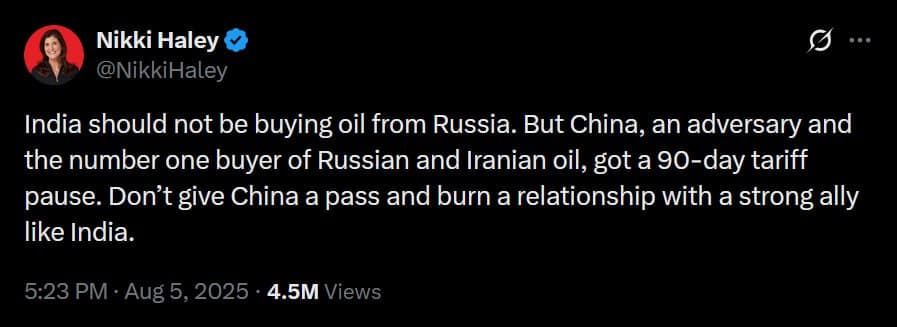Nikki Haley Urges Trump to Preserve India Relations Amid Tariff Threats
In a significant political maneuver, Indian-American Congresswoman Nimarata Nikki Randhawa, widely known as Nikki Haley, has publicly implored President Donald Trump to reconsider his stance on imposing tariffs against India. This request comes in the wake of Trump"s recent threats regarding trade tariffs, which Haley argues could jeopardize the longstanding relationship between the United States and India.
Background & Context
The United States and India have cultivated a complex yet strategic partnership over the years, marked by mutual interests in trade, defense, and regional stability. However, recent tensions have arisen as President Trump has signaled a willingness to impose tariffs on Indian goods, an action that Haley warns could trigger a detrimental spiral in bilateral relations. The Congresswoman"s intervention underscores the significance of maintaining strong ties with one of the world"s largest democracies, especially as geopolitical dynamics shift in response to China"s rising influence.
Haley"s concerns are compounded by the fact that, while Trump has threatened tariffs on India, he has simultaneously offered a 90-day suspension on similar measures against China. This juxtaposition raises questions about the United States" trade policy priorities and its long-term strategy regarding major Asian economies.
Key Developments
In her remarks, Haley emphasized the importance of diplomacy over punitive economic measures, stating, "It would be unwise to hit India with tariffs while extending a hand to China. We must not burn the relationship that has taken years to build." Her comments reflect a growing sentiment among lawmakers who advocate for a balanced approach to international trade, particularly in light of the ongoing trade war with China.
Haley"s call for restraint is particularly relevant given the current political climate, where trade relations are under intense scrutiny. As previously reported, the Trump administration has shifted its focus toward protecting American industries, often at the expense of international partnerships. However, Haley"s perspective suggests a need for a reevaluation of this approach, especially concerning allies like India, which plays a crucial role in counterbalancing China"s regional ambitions.
Broader Impact
The potential fallout from tariff implementation against India would not only affect bilateral trade but could also have wider implications for U.S. foreign policy in Asia. Experts argue that imposing tariffs could alienate India, pushing it closer to China and undermining U.S. efforts to build a coalition against Chinese expansionism. This scenario could have lasting consequences for U.S. interests in the Indo-Pacific region.
Moreover, Haley"s intervention highlights a broader trend within American politics, where voices advocating for international cooperation are increasingly at odds with more isolationist policies. The implications of this divide could reshape the future of U.S. trade relations, particularly as emerging markets like India continue to grow in significance. Analysts are closely monitoring how this situation develops, especially in light of recent global tensions, such as those outlined in Trump and Zelensky"s urgent call amid heightened global tensions.
What"s Next
As the situation unfolds, all eyes will be on the White House to see how it responds to Haley"s plea and the broader implications for U.S.-India relations. Moving forward, trade negotiations are likely to take center stage, with Congress pushing for a more nuanced approach that prioritizes diplomacy and mutual benefit over adversarial tactics.
Additionally, the potential for continued dialogue between the U.S. and Indian governments remains a critical area for development. Lawmakers from both parties may need to collaborate to find common ground on trade issues that respect the economic sovereignty of both nations while fostering a cooperative environment. In light of recent developments, the stakes are high, and the outcome will significantly influence international relations in the coming months.



![[Video] Gunfire between Iraqi security forces and Sadr militias in Baghdad](/_next/image?url=%2Fapi%2Fimage%2Fthumbnails%2Fthumbnail-1768343508874-4redb-thumbnail.jpg&w=3840&q=75)
